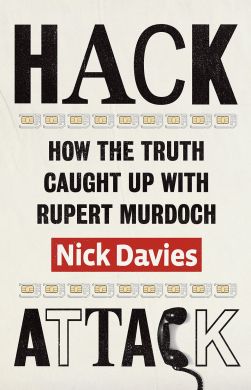The journalist who took on a media empire

REVIEW - Hack Attack: How the Truth caught up with Rupert Murdoch, by Nick Davies, Chatto & Windus.
It did not seem a big story when in 2006 a journalist and a private investigator were arrested for illegal phone hacking three Buckingham Palace staff. The News of the World dismissed the journalist as a rogue. However Nick Davies of the Guardian suspected the hacking was done with editorial consent and started on the track which led to the humiliation of Rupert Murdoch before a parliamentary commission and closure of the News of the World.
Hack Attack is a blow-by-blow account of Davies’ tenacious investigation with false tracks, mistakes, strokes of luck and Murdoch counterattacks. He was backed by his editor but for a long time many agreed with Boris Johnson that the accusations were ‘codswallop’. For years police and politicians had been too chummy with the Murdoch papers or too afraid of them to really scrutinise their methods and even the Press Control Commission came out on Murdoch’s side. Some celebrities such as the actress Sienna Miller, some journalists and lawyers joined in Davies’ campaign and attitudes changed dramatically with disclosure in 2011 that News of the World had hacked the phones of the parents of the killed 13 year old schoolgirl MIlly Dowler as well as the phones of relatives of soldiers killed in Afghanistan. This led to Rupert and James Murdoch and other executives appearing before a parliamentary commission. The defence was that they had known nothing. The Commission decided however that News of the World and other Murdoch papers such as The Sun had employed private investigators systematically to hack phones and also emails for information which boosted sales even if it ruined lives..
Davies narrates his investigation and in alternate chapters describes what he believes was going on in the Murdoch empire –News of the World journalists were not only hacking outsiders and rival papers but each other--, at Scotland Yard and in political parties. Some repetition results.
He is kinder to those on his side than to the Murdoch camp: for instance, in his treatment of Max Mosley who bankrolled many claimants. He does not mention the Mosley family’s Nazi sympathies or his sex parties but he blames the “foreign billionaire “ Rupert Murdoch for all the evils of Fleet Street and representing what, for Davies, is the underlying evil: neo-liberalism.
Rupert Murdoch had a point when he said tabloid journalism has always been roughhouse.
Indeed, it now has a more toxic potential because of its unprecedented ability for surveillance of private lives and also has keen competition from private users of internet. It is one of the issues spotlighted by this thorough and exciting book which indicates the need not only for crusading journalists but for impartial regulatory bodies and police and politicians with guts.


